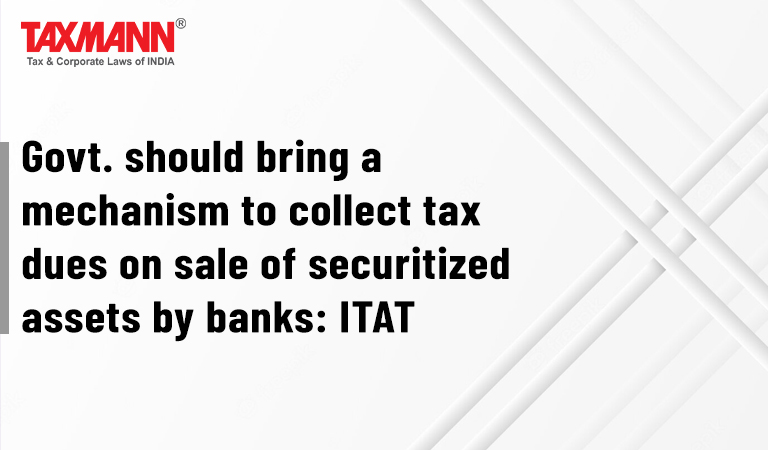Govt. should bring a mechanism to collect tax dues on sale of securitized assets by banks: ITAT
- Blog|News|Income Tax|
- 2 Min Read
- By Taxmann
- |
- Last Updated on 29 October, 2022

Case Details: Abbasbhai A. Upletawala v. ITO - [2022] 143 taxmann.com 384 (Mumbai-Trib.)
Judiciary and Counsel Details
-
- Pramod Kumar, Vice-President & Pavan Kumar Gadale, Judicial Member
- Madhur Agarwal, Fenil Bhate & Kiran Mehta for the Appellant.
- Shailja Rai & Manoj Sinha for the Respondent.
Facts of the Case
Assessee was a director and had given his personal guarantee to the State Bank of India (SBI) in respect of his company’s commercial borrowings. Later, the SBI recalled the credit facilities given to the Company and invoked the personal guarantee given by the assessee.
SBI entered into an assignment agreement with Asset Reconstruction Co India Ltd (ARCIL). The land, which was offered as collateral security, was assigned to the ARCIL. Said land was sold to Advent Developers Pvt Ltd (ADPL). The assessee was confirming party to this sale transaction between ARCIL and ADPL.
The Assessing Officer (AO) held that the assessee had earned long-term capital gains on the sale of such land and was liable to pay tax. The assessee carried the matter in appeal before the CIT(A) but without success. The matter reached before the Tribunal.
ITAT Held
The Tribunal held that what is important in the instant case is the year in which the transfer takes place. So far as the transaction is concerned, that is between the ARC and the end buyer. But the very fact that ARC is selling the property as the owner of the property does indicate that the transfer from the assessee to the ARC, via SBI perhaps, took place at an earlier stage. That is the year of transfer in which the taxability arises so far as the assessee is concerned
However, it is also not clear as to what is the date on which the transfer took place from the assessee to the State Bank of India, and what is the documentation or court/ DRT orders in this regard. Thus, the matter is remanded back to the CIT(A) for recording a specific finding in this regard.
Further, there is also a fundamental point regarding the protection of legitimate interests of the revenue. In most cases in which the assets are taken over as part of the recovery of commercial borrowing, there is no mechanism to ensure that the tax dues are secured in the process of the sale of such properties.
The owners of these assets have no money to pay the tax as they are already bankrupt and no part of the sale consideration reaches them anyway. The recipients of sale considerations in these transactions, i.e. the banks and the ARCs, have no liability to make such payments of taxes even in the vicarious capacity as tax withholdings.
Thus, it is time that the Government seriously considers protecting its legitimate interests by ensuring some mechanism to ensure that the tax liability on the capital gains is duly recovered from the borrower whose property is sold. Furthermore, when it is not possible to do so on account of the borrower’s genuine financial difficulties, the tax dues may be recovered from the person who receives the proceeds of the sale of such assets.
Disclaimer: The content/information published on the website is only for general information of the user and shall not be construed as legal advice. While the Taxmann has exercised reasonable efforts to ensure the veracity of information/content published, Taxmann shall be under no liability in any manner whatsoever for incorrect information, if any.

Taxmann Publications has a dedicated in-house Research & Editorial Team. This team consists of a team of Chartered Accountants, Company Secretaries, and Lawyers. This team works under the guidance and supervision of editor-in-chief Mr Rakesh Bhargava.
The Research and Editorial Team is responsible for developing reliable and accurate content for the readers. The team follows the six-sigma approach to achieve the benchmark of zero error in its publications and research platforms. The team ensures that the following publication guidelines are thoroughly followed while developing the content:
- The statutory material is obtained only from the authorized and reliable sources
- All the latest developments in the judicial and legislative fields are covered
- Prepare the analytical write-ups on current, controversial, and important issues to help the readers to understand the concept and its implications
- Every content published by Taxmann is complete, accurate and lucid
- All evidence-based statements are supported with proper reference to Section, Circular No., Notification No. or citations
- The golden rules of grammar, style and consistency are thoroughly followed
- Font and size that’s easy to read and remain consistent across all imprint and digital publications are applied



 CA | CS | CMA
CA | CS | CMA
